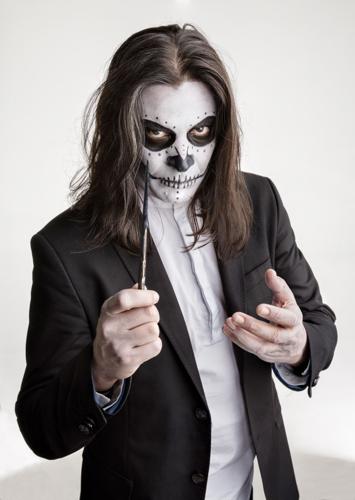When the solemn All Souls Procession is done, a grand finale begins, with music, dance and the burning of the urn full of offerings and messages.
It’s a respectful and spectacular end to the annual community event.
This year, after the route winds through the Barrio Hollywood neighborhood and spills into Mercado San Agustin on Sunday, Nov. 5, the Tucson Symphony Orchestra will underscore the end the event — the first time the orchestra has participated.
It is one of two concerts the TSO will perform to celebrate All Souls, and it’s part of a weekend of concerts from the orchestra and Tucson’s venerable professional choir True Concord Voices & Orchestra themed around the popular Tucson event. True Concord will perform its “Metamorphisis” concert — anchored by Gabriel Fauré’s soul-lifting Requiem — four times this weekend beginning at 7:30 p.m. Thursday, Nov. 2, at Tucson’s Christ the King Episcopal Church.
On Friday, Nov. 3, the TSO kicks off All Souls weekend with the popular cross-border Mariachi Los Camperos, whose local ties include performing with Tucson native Linda Ronstadt on her Grammy-winning 1987 album “Canciones de Mi Padre.” The concert is at Tucson Music Hall downtown and is part of newly installed music director José Luis Gomez’s vision to reach out to Tucson’s Hispanic community.
“Dia de los Muertos is a Mexican thing,” said the Venezuelan-born, Spanish-raised Gomez, TSO’s conductor. And it’s such a Tucson thing — which is why, he said, he eagerly wanted the orchestra that he inherited last year — this is his official first season — to be involved in the popular communitywide All Souls event.
In addition to being the TSO’s first time at All SOuls, it’s also the first time in years that the ensemble, which will have as many players as it employs for its pops concerts, will perform outdoors. It fulfills one of Gomez’s main objectives, to “bring the orchestra out of the concert hall” and expose the community to the music. Although people may know that Tucson has a professional orchestra, many have never heard it, and taking the orchestra to the people in the middle of a popular community event achieves that end result, he said.
At Sunday’s concert, beginning around 7:30 p.m., the orchestra will perform Prokofiev’s “Romeo and Juliet,” the ultimate story of love and death; Mussorgsky’s “Night on Bald Mountain,” inspired by a witches’ Sabbath; Schubert’s solemn “Ave Maria,” featuring Chicago soprano Samantha Farmilant; and Saint-Saëns’ “Danse macabre,” based on the old French superstition that Death appears at midnight on Halloween and summons the dead to dance until dawn.
The 45-minute performance closes with Stravinsky’s “Firebird” Suite, which the orchestra performed in late October. But this version features dancers and aerialists and fire spinners to carry out the concert’s theme of “The Marriage of the Sun and Moon.”
True Concord is also new to All Souls, said founder and music director Eric Holtan, but this year the timing was right. The professional choir in years past has programmed its November concert in the middle of the month, a week or two after All Souls.
In addition to Fauré’s Requiem, Holtan’s choir will perform American composer David Lang’s “Little Match Girl Passion,” based on Hans Christian Anderson’s short and tragic story “Little Match Girl.” The story follows a peasant girl out on a bitter cold New Year’s Eve, barefoot and without a coat, selling matches. Unable to convince the passersby to buy from her, she strikes the matches to keep warm and in the flames sees the vision of her dead grandmother. Before long, she has lit all her matches and dies in the cold, her spirit lifted to heaven by her grandmother.
“The story itself is really the story of the transition from death to life,” Holtan said.
This is the second time in its 14 years that True Concord will perform the Fauré, one of the best-known and beloved works in the requiem repertoire.
“It is beautiful, romantic music, it is serene and peaceful. It eschews the whole fire and brimstone that you get in Mozart and Verdi” requiems, Holten said, explaining that the French composer chose to consider death from the angle of heaven and peace “so there’s a beautiful and a calm and a serenity to it that is really pretty stunning.”





